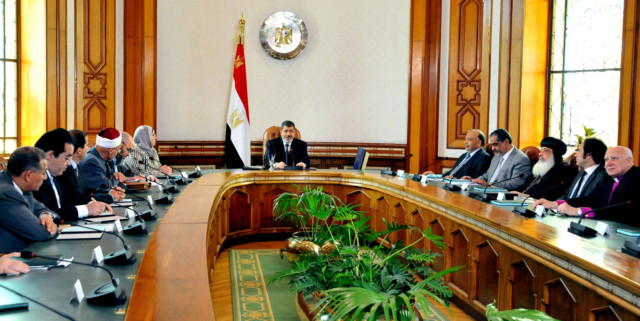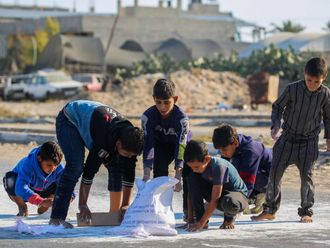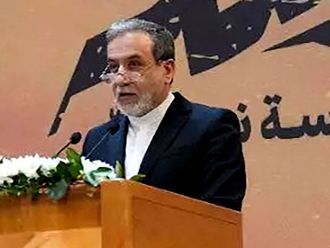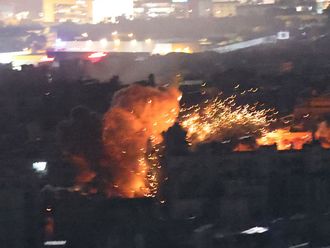
Cairo: The live broadcast of a consultative meeting held by Egyptian President Mohammad Mursi and various political figures on Monday to discuss the consequences of Ethiopia’s controversial Renaissance Dam has sparked widespread criticism.
Most of the attendants were unaware that the meeting was being aired live.
Last week, Ethiopia announced the diversion of the Blue Nile’s stream as a step towards launching works on its Renaissance Dam. But the declaration and the project in general spurred fears in Egypt and Sudan that the diversion would affect their shares of waters which they obtained under British occupation.
“We will work on absorbing the shock caused by the Millennium Dam”, Mursi said during the meeting, aired by Egypt’s state TV, adding that the dam will affect only eight per cent of the total of Egypt’s electricity generation.
Commenting on some expert predictions that the dam might collapse and pose a danger to Egypt, the president said: “This, of course, will be in Egypt’s favour, but we cannot say that [officially]”.
Mursi’s foreign affairs secretary, Khalid Al Qazzaz, said Ethiopia had breached international agreements by embarking on this project.
The most controversial contribution was made by Ayman Nour, chairman of the Ghad Al Thawra party, who suggested that Egypt disseminate rumours that it is seeking advanced aircraft. Nour said this was a technique of intimidation used by intelligence agencies.
“It might not be realistic, but it will bring results on the diplomatic path,” he added.
Nour, however, said he believes diplomatic efforts will not yield great outcomes: “Ethiopians have taken the decision, and it is highly difficult for them to backtrack.”
Mohammad Sa’ad Al Katatny, former parliament speaker and chairman of the Muslim Brotherhood’s Freedom and Justice Party, said all options are available in handling the crisis. He added that a report submitted by a panel of experts on the dam raises concerns.
Younis Makhyoun, chairman of the Salafi Nour Party, said the last option Egypt has is to use its secret services to demolish the dam, describing the project as a declaration of war.
Chairman of the moderate Islamist Wasat Party, Abul Ela Mady, suggested sending army destroyers to the Bab Al Mandab strait, close to Ethiopia, and spreading rumours that Egypt is about to strike the dam.
Calls on Mursi to apologise
Mohammad Al Baradei, National Salvation Front Coordinator, called on President Mursi to apologise to Ethiopia and Sudan for “the irresponsible utterances” made during the national dialogue session.
On his Twitter account, Al Baradei — also the President of the Dostour Party — demanded that Mursi offer similar apologies to both countries in the name of Egyptians.
Nour was angered by the live broadcast of the national dialogue because it included sensitive national security issues and suggestions for naval action.
He demanded to hold responsible those who decided to broadcast what was supposed to be a closed dialogue session.
Former information minister Osama Haikal said broadcasting the meeting live was “a farce” that reflects “the state of absurdity Egypt is experiencing”.
“Is that the way to solve a national security issue?” he wondered in a phone-in with Tahrir satellite channel late on Monday.
“There should have been a meeting by the National Defence Council to determine the method of handling that crisis,” Haikal affirmed.
Haikal blamed President Mursi for the confusion concerning the broadcast of the meeting.
“There is no way the meeting was aired without Mursi’s knowledge. Had I been an Ethiopian watching that meeting, I would have concluded that Egypt is a failing state that has run out of options. The President invited irrelevant personalities to solve a national security issue. The whole world is now laughing at Egypt because of that meeting.”
Pakinam Al Sharqawy, assistant presidential adviser for political affairs apologised for forgetting to notify the participants about this.
She extended her apologies for “any unintended embarrassment caused to any of the political leaders who attended the national dialogue session to discuss the report submitted by the tripartite committee on the Ethiopian Renaissance Dam.”
On her Facebook page, Al Sharqawy said the decision for the live broadcast of the dialogue session was taken just before the session, due to the significance of the Nile water dossier.












